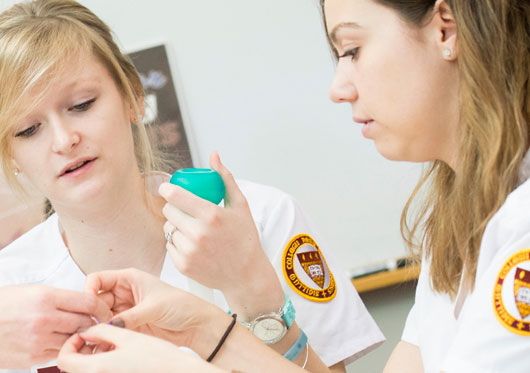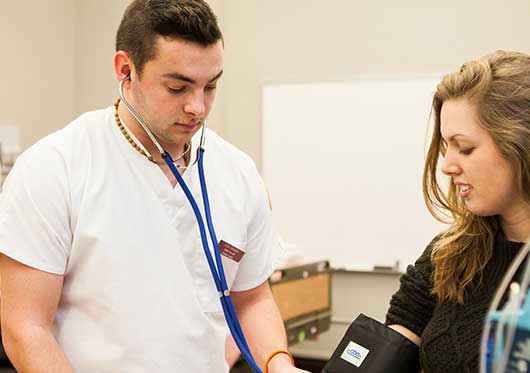If you are interested in pursuing a career in nursing and becoming a nurse, then your first step is to identify your path into the field. For many aspiring nurses, becoming a registered nurse (RN) is the most logical entry point.
RNs enjoy a competitive salary, significant job stability, and a high level of personal and professional satisfaction due to the real and lasting impact that they have every single day on the lives of their patients. But for those unfamiliar with the many different nursing titles out there, there is an obvious question to be answered: What do registered nurses do?
Below, we answer this question by walking through the typical roles and responsibilities that RNs perform on a daily basis. We also explore the different environments that RNs tend to work in and highlight some of the key steps that you’ll need to take on your path to becoming a registered nurse.
What Is a Registered Nurse (RN)?
A registered nurse (RN) is a healthcare professional who provides direct care to patients. RNs play a critical role in patient care, working in a variety of settings including hospitals, clinics, and community health centers. Their expertise and compassion are essential in promoting health, preventing illness, and managing chronic conditions.
What Do Registered Nurses Do On a Daily Basis?
Registered nurses perform a wide variety of tasks from day to day depending on where they work, the patient population they care for, and the size of the overall healthcare team that they’re employed on.
“A typical day for a registered nurse is multifaceted,” says Donna Glynn, PhD, RN, ANP, and associate dean of pre-licensure nursing at Regis College. “No two days are ever the same. If you expect to walk into that healthcare organization and have the same day that you had the day before, you're never going to see two days that are even remotely the same. Every patient is different, every family is different, every situation is different—and that's what makes it so exciting.”
Duties of a Registered Nurse
While the job responsibilities of a nurse may vary each day, some of the most common duties you’ll perform as an RN include:
- Conducting patient assessments and observations such as checking their vital signs
- Recording a patient’s medical history and symptoms as necessary
- Collaborating with the broader medical team to create a patient care plan
- Administering the prescribed treatments and medications
- Performing wound care (i.e., changing bandages)
- Drawing blood, urine samples, etc. for laboratory work
- Educating patients (and relevant family members) about how to best manage an injury, condition, or illness
- And more
“It’s really focused on that higher level of assessing the patient, identifying the patient's critical needs, and implementing a plan to meet that patient's needs,” says Glynn.
Typically, a registered nurse will report either to their nursing manager or the physician responsible for the patient’s care, depending on the situation. On the other hand, RNs will often directly supervise licensed practical nurses (LPNs), licensed vocational nurses (LVNs), certified nursing assistants (CNAs), and nursing students, as necessary.
Where Do RNs Work?
Registered nurses can work in a variety of healthcare settings. Most commonly, an RN will work in intensive care units, long-term care facilities, home healthcare services, physician’s offices, outpatient clinics, or schools. Some large corporations may also employ RNs directly on their premises in much the same way as schools do. You might even choose to become a military nurse.
Similarly, a registered nurse might work with a wide range of patient populations or specialize in a specific area such as oncology, neonatal, pediatric, family medicine, geriatric, critical care, addiction, or rehabilitation.
Skills Necessary to Succeed as a Registered Nurse
Glynn notes that some of the most important skills RNs must develop to succeed in the nursing field are their critical thinking, clinical judgment, delegation, and case management skills. Building those skills and becoming truly proficient is a critical component of being able to provide total, person-centered care.
Other important skills include:
- Organizational skills
- Stress management
- Effective communication
- Problem-solving
- Leadership
- Teamwork and collaboration
If you find that you’re lacking in a particular area, there’s some good news as well: You’ll have plenty of opportunities to improve.
“As nurses, we’re always learning,” says Glynn. “You never get to a point in your career where you know everything there is to know. There will always be new medications, new procedures, and new technologies. It’s one of the most exciting parts of the job.”
RN Salary and Job Outlook
There are a variety of benefits to becoming an RN. For individuals passionate about saving lives, this trusted profession provides an opportunity for them to play an important role in improving the health and wellness of many individuals and communities every single day.
Along with being able to help others, RNs are one of the most desired healthcare professionals across the country. They are an integral part of the success of medical care and will continue to be needed in the coming years to provide direct patient care to an aging population. The demand for RNs is confirmed by the American Association of Colleges of Nursing (AACN) with more than 203,000 new registered nursing positions projected to be created each year from 2021 to 2031.
In addition to the high demand and rewarding nature of the profession, registered nurses also benefit from competitive salaries. According to the U.S. Bureau of Labor Statistics, the average RN salary was $86,070 in 2023 with the highest 10 percent earning more than $132,680. This strong earning potential and breadth of opportunities make nursing a stable career path for those passionate about health care.
Education Required to Become a Registered Nurse
If you’re interested in becoming an RN, it’s important to understand the path you'll need to take to pursue a nursing degree, as well as the educational and licensing requirements you’ll have to meet.
At a minimum, you will need to earn an associate’s degree in nursing, pass the NCLEX-RN exam, and apply for your nursing license in the state in which you wish to practice. But it’s important to note that many employers no longer consider applicants for RN positions who have only earned their associate’s degree.
In order to increase your hireability, the general consensus is that earning your Bachelor of Science in Nursing (BSN) is the way to go.
How many years does it take to be an RN?
The amount of time it takes to become an RN depends on the type of degree you want to pursue. On average, it takes around four years to become a registered nurse, but there are other pathways that take less time. For example, a popular option involves pursuing an associate’s degree in nursing in just two years instead of a four-year BSN. However, aspiring nurses should know that employers now require new hires to earn their BSN in order to be considered for an RN position.
While this might seem like an obstacle, there is a way to meet the necessary requirements and enter the field of nursing as quickly as possible. Through a number of accelerated nursing programs you can become a registered nurse in as little as 16 months.
How To Know If Nursing Is Right For You
To determine if nursing is the right career for you, start by evaluating your interests and personality traits. Having a strong interest in healthcare and science is crucial, as nurses deeply engage with medical treatments, health conditions, and patient care. Assess your empathy, compassion, and desire to help others, as these are fundamental in a profession centered around caring for people in various states of health.
Also, consider your ability to handle emotional and physical stress, as nursing involves dealing with critical situations and requires stamina to manage long shifts and physically demanding tasks.
Additionally, consider your skills and how a nursing career would impact your lifestyle. Effective communication, attention to detail, problem-solving abilities, and resilience are essential for success in nursing. Take into account shift work, including nights and weekends, as well as the educational commitment required. Getting first-hand experience through job shadowing or volunteering in healthcare settings can offer a valuable perspective into the daily realities of the profession, helping you decide if it's the right career for you.
Take the Next Step in Your Nursing Career
Becoming a registered nurse is not just a career; it's a calling to make a significant difference in the lives of others. If you’re considering entering the field or advancing your career by becoming an RN, now is the time. At Regis College, our accelerated nursing programs are designed to set you on your path toward success.






